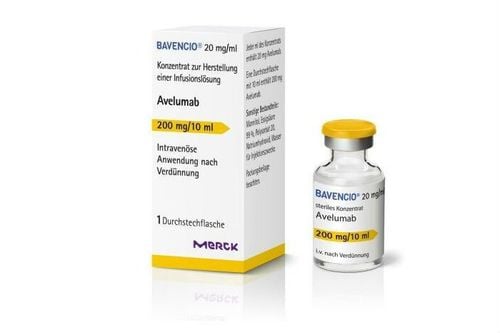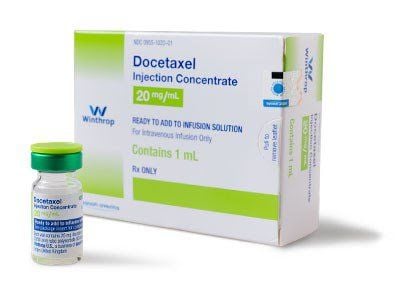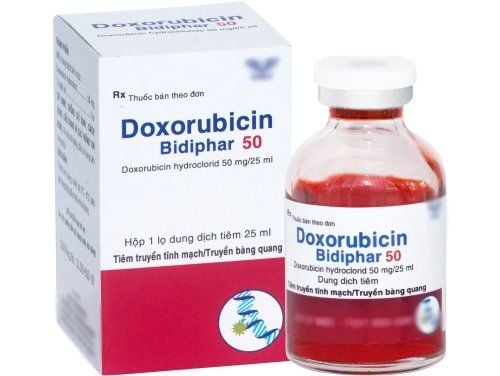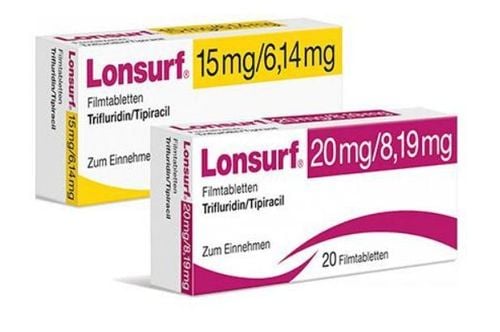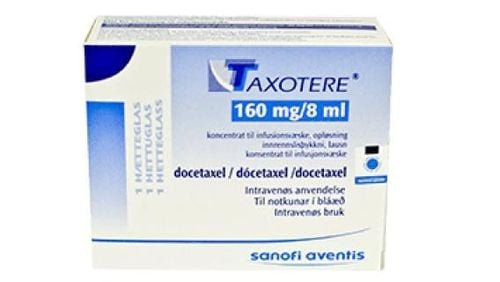This is an automatically translated article.
Pecabine 150mg is a cancer treatment drug, the main ingredient is Capecitabine. Pecabine is used in the treatment of breast cancer, colorectal cancer and stomach cancer by itself or in combination with other drugs.1. Uses of Pecabine 150mg
Pecabine belongs to the group of anti-cancer drugs and affects the immune system, with the main ingredient being Capecitabine 150mg. Capecitabine is an active ingredient that has a selective cytotoxic effect on tumor cells, blocking or slowing the growth of cancer cells, reducing tumor size.
Pecabine 150mg is made in the form of film-coated tablets and is indicated for use alone or in combination with other cancer therapies, specifically as follows:
Breast cancer: Used in combination with docetaxel to treat cancer locally advanced or metastatic breast cancer, when a patient has failed previous chemotherapy. Colorectal cancer: Used alone in the adjuvant treatment of colon cancer after surgery or metastatic colorectal cancer Gastric cancer: Combination of Pecabine 150mg with platinum compounds in the treatment of gastric cancer thick step 1.
2. How to use and dose Pecabine 150mg
Pecabine is to be taken orally, taken with water and food, preferably within 30 minutes after a meal.
Single dose of Pecabine in the treatment of breast cancer and colorectal cancer: 1,250mg/m2 body surface area/time, administered twice a day and continuously for 14 days, then rest for 7 days.
Dosage of Pecabine in combination with other drugs in specific cancer treatment is as follows:
Breast cancer: In combination with docetaxel, the initial dose is 1,250mg/m2/time, used twice a day and continuously in 2 weeks, then 1 week off. Colorectal, stomach cancer: 800 - 1,000mg/m2/time, used 2 times/day and continuously for 2 weeks, then take 7 days off. If treatment is continuous without rest, the dose is 625mg/m2/time and also 2 times/day. An overdose of Pecabine also causes symptoms similar to the side effects of the drug. In addition, it can cause liver and kidney toxicity. In this case, the patient should be monitored for symptoms of blood pressure, skin and facial manifestations to prevent danger from happening quickly. To ensure safety for health and life, the patient should immediately notify the doctor when the patient has strange symptoms of an overdose.
3. Pecabine 150mg . side effects
Pecabine medicine can cause some of the following undesirable side effects:
Digestion: Abdominal pain, indigestion, constipation, nausea, vomiting, diarrhea. Skin: Dermatitis , stomatitis, inflammation of the hands and feet. Body as a whole: Weakness, fatigue, poor appetite. Musculoskeletal: Muscle aches, body aches and pains. Nervous system: Dizziness, headache, trouble sleeping. Metabolism: Dehydration, hypercalcemia, hyperbilirubinemia, hypertriglyceridemia. If you see any strange symptoms after taking Pecabine, you should immediately report it to your doctor or go to a medical facility for examination.
4. Some notes when using Pecabine 150mg
Do not use Pecabine in people with hypersensitivity to the ingredients of the drug, people with severe renal failure (with ClCr less than 30ml/min), people taking drugs like Brivudin or Sorivudin, people with dihydropyrimidine dehydrogenase deficiency. Pecabine 150mg should not be used in people with severe leukopenia, neutropenia, thrombocytopenia, severe liver failure, who are being treated with the drugs Gimeracil, Oteracil potassium Tegafur or within 7 days after stopping the drug. Pecabine should not be used in patients with galactose intolerance or glucose-galactose malabsorption, or in patients with Lapp lactase deficiency. Women who are pregnant or nursing should not take Pecabine. People with liver failure, bone marrow failure, elderly people (over 65 years old), with a history of increased or decreased calcium in the blood, peripheral or central nervous system disease, coronary artery disease, diabetes, ulcers or bleeding Digestive disorders, electrolyte disturbances, hand and foot syndrome grade 2 - 3 should be used with caution when using Pecabine. Limit the activities of driving or operating, operating machinery while taking Pecabine because the drug can cause headaches, dizziness. While taking Pecabine, patients should strictly follow the doctor's instructions, do not increase or decrease the dose on their own. If you intend to stop taking Pecabine, the patient should consult or prescribe a doctor. Pecabine may interact with the anticoagulant Coumarin and increase the anticoagulant effect and the risk of side effects. In order to limit drug interactions, patients should be monitored for coagulation indices and adjusted anticoagulant dosage accordingly. Pecabine interacts with Phenytoin and increases plasma concentrations of this drug. Taking pecabine with certain magnesium-containing antacids may slightly increase capecitabine concentrations. Pecabine may interact with sorivudine and similar drugs and increase the toxicity of dihydropyrimidine dehydrogenase which is life-threatening. Therefore, these drugs should not be used concurrently. Before starting treatment with capecitabine, wait a minimum of 4 weeks after taking sorivudine or similar drugs. If co-administered with leucovorin, pecabine may increase the toxicity of capecitabine because leucovorin affects the pharmacodynamics of capecitabine. The use of Pecabine is to selectively affect tumor cells, preventing cancer cells from growing and developing, especially breast cancer and stomach cancer - colorectal cancer. To ensure the effectiveness of treatment and avoid unwanted side effects, patients need to strictly follow the instructions of the doctor, professional pharmacist.
Follow Vinmec International General Hospital website to get more health, nutrition and beauty information to protect the health of yourself and your loved ones in your family.
Please dial HOTLINE for more information or register for an appointment HERE. Download MyVinmec app to make appointments faster and to manage your bookings easily.




